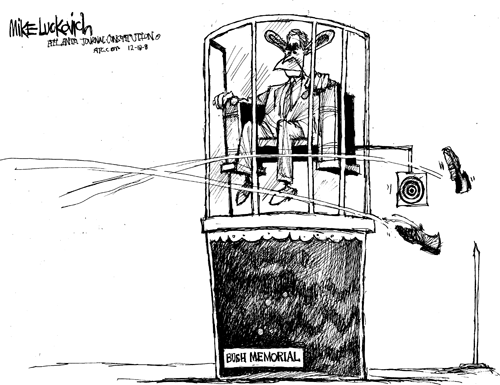WASHINGTON — President Bush shared some bittersweet reflections on Thursday as he looked back fondly on his White House days but regretted his inability to win passage of immigration legislation and to change the tone of debate in the capital.
"Reflections by a guy who's headed out of town," Mr. Bush called his musings in a question-and-answer session at the American Enterprise Institute. "An old sage at 62 ... headed to retirement."
The president, who has described himself as uncomfortable with introspection, loosened up considerably before a friendly audience of conservatives. Better to have tried and failed than never to have tried at all was a theme he embraced several times.
"One such problem was immigration reform," the president said. "And in this case, I chose to put the spotlight directly on the issue by giving an Oval Office address. Obviously, we weren't successful about getting comprehensive immigration reform. Nevertheless, I feel good about having tried."
And while he will miss many things about Washington, he won't miss "the petty name-calling," Mr. Bush said.
"I came with the idea of changing the tone in Washington, and frankly didn't do a very good job of it," he said. "You know, war brings out a lot of heated rhetoric and a lot of emotion. I fully understand that."
The president reiterated his faith in freedom and in free markets, the current financial crisis notwithstanding. And while he voiced his continued optimism about the American people, he said one of his "great fears" was that troubles overseas might tempt the country to revert to isolationism.
"The world needs America's involvement," he said. "We're a compassionate, decent, strong nation."
The president spoke about big issues (Iraq and tax policy, for instance) and not so big ones, like his relationship with the White House press corps. "I don't like some of the things they say," Mr. Bush said. "Of course, they don't like some of the things I say. But we've had a good relationship."
A lot of spirited intramural debate preceded the 2007 increase of American troops in Iraq, Mr. Bush said in observing that "creating tension is good for decision-making, so long as it doesn't become destructive."
When asked about President-elect Barack Obama's assertions that "Bush deregulation" had led to a culture of recklessness and greed on Wall Street, Mr. Bush said he was looking forward "to the true history of this financial crisis being written."
"Just some thoughts on this," he said. "The markets sometimes create excesses. We're living through the consequences of the excess. I quipped in Texas that Wall Street got drunk, and we got a hangover."
But this, too, shall pass, he said of the current storm. And when it does, he said, elected officials should remember that "markets and free enterprise is what made the country great," and that government's proper role is promoting entrepreneurship and prosperity, not getting deeply involved in the mortgage business or managing car companies. And, yes, he retains his faith in low taxes as the best economic stimulus of all.
The president said the country "needs to overcome its fear about nuclear power" if Americans want to have all the electricity they will need and still protect the environment.
"In terms of safety, the engineering has changed dramatically from the past," he said. (Coincidentally, Mr. Bush spoke 51 years to the day after the Shippingport Atomic Power Station, near Pittsburgh, became the first civilian nuclear plant to generate electricity in the United States.)
Mr. Bush implied that the harsh words of the presidential campaign were all but forgotten when he and Mr. Obama met in the Oval Office recently. The retiring president refused to say what advice he had given his successor but said they had chatted about something in common: "He's a dad who will have two daughters in the White House."
Mr. Bush, one of the least popular presidents in recent history, if public opinion polls are accurate, said the individual in the Oval Office is not that important: "Presidents will come and go with their strengths and weaknesses, but the ship of state sails on because of the institution being greater than the person."
And political conservatives who fear that the November elections banished them to the wilderness should take heart, Mr. Bush said. Remember the Democratic landslide led by President Lyndon B. Johnson in 1964, he said, and recall that just two years later Republican conservatives triumphed across the country.
"My point is that things go in cycles in politics," he said.

